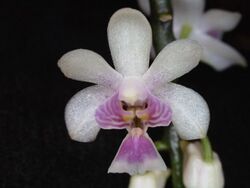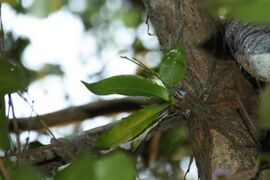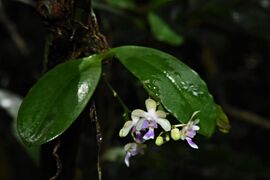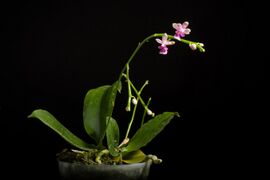Biology:Phalaenopsis deliciosa
| Phalaenopsis deliciosa | |
|---|---|

| |
| Flower of Phalaenopsis deliciosa | |
| Scientific classification | |
| Kingdom: | Plantae |
| Clade: | Tracheophytes |
| Clade: | Angiosperms |
| Clade: | Monocots |
| Order: | Asparagales |
| Family: | Orchidaceae |
| Subfamily: | Epidendroideae |
| Genus: | Phalaenopsis |
| Species: | P. deliciosa
|
| Binomial name | |
| Phalaenopsis deliciosa Rchb.f.
| |
| Subspecies[1] | |
| |
| Synonyms[1][2][3] | |
Synonyms of Phalaenopsis deliciosa subsp. deliciosa
Synonyms of Phalaenopsis deliciosa subsp. hookeriana
| |
Phalaenopsis deliciosa is a species of orchid occurring from the Indian subcontinent to Malesia and China . [4] The species is a miniature epiphytic herb. The leaves are unique due to their undulate margins. This characteristic greatly simplifies the identification of the species, even when specimens are not currently flowering. The small flowers (1 cm in diameter) are usually slightly pink, but white and yellow forms exist as well. Old inflorescences, which are usually panicles or more rarely racemes, may continue to grow and form new flowers over several flowering periods.
Conservation
This species is protected under the Convention on International Trade in Endangered Species of Wild Fauna and Flora CITES and thus is regarded as potentially endangered. Studies on efficient in vitro propagation have been undertaken. [5] Production of artificially propagated plants can reduce poaching by satisfying market demand through artificially propagated plants. The propagated plants may be also be re-introduced to the wild. For proper ex-situ conservation, plants in cultivation should reflect the variability of natural populations and should not be hybridised. [6]
Taxonomy
This species has been described numerous times by different authors and has been assigned to different genera. A revision by Christenson cleared up some confusion. Currently two subspecies are currently recognised: Phalaenopsis deliciosa subsp. deliciosa and Phalaenopsis deliciosa subsp. hookeriana.[1] In addition a white variant Phalaenopsis deliciosa f. alba is reported. According to Christenson, this species is placed in the section Deliciosae within the subgenus Phalaenopsis. [7] The monophyly of this section is disputed, as Phalaenopsis deliciosa was demonstrated to be more closely related to species of the section Aphyllae than to Phalaenopsis chibae, which is also placed within the section Deliciosae. [8]
Horticulture
This species is sometimes found in cultivation. It has also been used to create miniature Phalaenopsis cultivars. According to the International Orchid Register, which is maintained by the Royal Horticultural Society, 41 hybrids have been registered, in which one of the parents is Phalaenopsis deliciosa.
Images
- Images
External links
References
- ↑ 1.0 1.1 1.2 "Phalaenopsis deliciosa Rchb.f. | Plants of the World Online | Kew Science". https://powo.science.kew.org/taxon/650526-1.
- ↑ "Phalaenopsis deliciosa subsp. deliciosa" (in en). Royal Botanic Gardens, Kew. http://www.plantsoftheworldonline.org/taxon/77169397-1. Retrieved 5 July 2022.
- ↑ "Phalaenopsis deliciosa subsp. hookeriana (O.Gruss & Roellke) Christenson" (in en). Royal Botanic Gardens, Kew. http://www.plantsoftheworldonline.org/taxon/1019590-1. Retrieved 5 July 2022.
- ↑ "Phalaenopsis deliciosa RCHB. Fil. - Encyclopedia of Life". https://eol.org/pages/1135571.
- ↑ Choong, Chieh & Lim, Chin & Xiong, Zherui & Choong, Siew. (2015). Effect of In Vitro Nitrogen Nutrition to Phalaenopsis deliciosa Seedling Growth. OnLine Journal of Biological Sciences. 16. 17-25. 10.3844/ojbsci.2016.17.25.
- ↑ Reppenhagen, W. (1980). Conservation by Propagation. The Cactus and Succulent Journal of Great Britain, 42(3), 71–74. http://www.jstor.org/stable/42786364
- ↑ Christenson, E. A. (2001). Phalaenopsis: a monograph. Timber Press (OR).
- ↑ Tsai, C. C., & Chou, C. H. (2007). Molecular phylogenetics of Phalaenopsis taxa: an updated review. Orchid Sci Biotechnol, 1, 44-50.
Wikidata ☰ Q1309960 entry
 |




